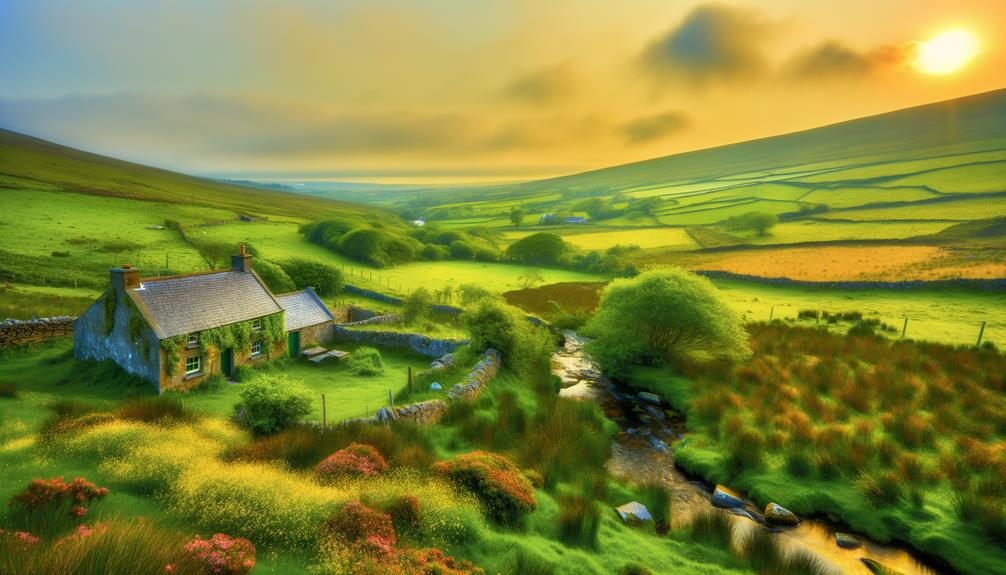Maureen Name Meaning and Origin
The name Maureen originates from the Irish name Mairin, a diminutive of Mary, which traces back to the Hebrew name Miriam, meaning "bitterness" or "beloved." It signifies "little Mary" or "young Mary" in Irish, blending Hebrew, Latin, and Gaelic influences. Popularized in late medieval Ireland and anglicized by the 19th century, Maureen saw a mid-20th century surge due to figures like Maureen O'Hara.
It embodies a rich cultural heritage reflected in literature and folk songs. Despite fluctuating popularity, it maintains a classic charm.
Further exploration reveals more about its historical and cultural context.

Key Takeaways
- Maureen originates from the Irish name Máirín, meaning 'little Mary' or 'young Mary.'
- Máirín is derived from the Hebrew name Miriam, which means 'bitterness' or 'beloved.'
- The name gained popularity in the 19th century and peaked in the mid-20th century.
- Maureen is celebrated in Irish culture and literature, symbolizing traditional femininity.
- Prominent namesakes include Maureen O'Hara and Maureen McCormick, adding cultural significance.
Etymology and Linguistic Roots
The name Maureen originates from the Irish name Máirín, which is a diminutive form of Mary, itself derived from the Hebrew name Miriam. The Hebrew name Miriam is believed to mean 'bitterness' or 'beloved,' reflecting its ancient origins.
Máirín, translating to 'little Mary' or 'young Mary,' was adopted into Irish culture, retaining the affectionate diminutive connotation. Phonologically, Maureen exemplifies the soft, melodic qualities typical of Gaelic names.
The evolution of Máirín into Maureen in English-speaking contexts showcases the linguistic progression facilitated by cultural interchange. This etymological journey underscores the name's deep historical roots, embodying a fusion of Hebrew, Latin, and Gaelic influences, each stratum contributing to its rich, multifaceted heritage.
Historical Usage
Tracing the historical usage of the name Maureen reveals its enduring popularity across different cultures and time periods.
Originating from the Irish Gaelic name Máirín, a diminutive of Mary, Maureen first gained prominence during the late medieval period in Ireland.
The anglicized form, Maureen, became widely adopted in English-speaking countries by the 19th century.
In the mid-20th century, the name surged in popularity due to its association with prominent figures in literature and film, such as actress Maureen O'Hara.
Historical records indicate Maureen maintained a steady presence in birth registries throughout the 20th century, reflecting its consistent appeal.
The name's resilience can be attributed to its melodic sound and deep-rooted cultural heritage.
Cultural Significance
Maureen holds significant cultural value, particularly within Irish communities, where it is celebrated for its etymological roots and historical resonance. Derived from the Irish name Máirín, which is a diminutive of Mary, Maureen embodies a connection to Ireland's rich linguistic heritage.
Its cultural significance is underscored by several key factors:
- Literature: Maureen appears in various Irish literary works, symbolizing traditional Irish femininity.
- Music: The name is featured in folk songs, indicating its deep-rooted presence in Irish cultural expressions.
- Historical Figures: Prominent Irish women named Maureen have contributed to its enduring legacy.
- Religious Connotations: As a derivative of Mary, it holds religious importance, often associated with the Virgin Mary in Catholic communities.
Understanding Maureen's cultural significance offers a glimpse into its enduring appeal.
Popularity Over Time
Examining Maureen's popularity over time reveals a fluctuating trajectory influenced by historical events, cultural shifts, and changing naming trends. Originating from the Irish Mairín, a diminutive of Mary, Maureen gained traction in the early 20th century as Irish names became fashionable.
Its peak in the United States occurred during the 1940s and 1950s, partly due to the prominence of Irish-American culture and notable figures bearing the name. Subsequently, Maureen's usage has waned, reflecting broader shifts towards modern and diverse naming conventions.
Despite its decline, the name retains a classic charm, underscored by its etymological roots and historical resonance. Today, Maureen endures as a reflection of cultural heritage and the ever-evolving landscape of personal names.
Famous Namesakes
Among notable individuals who have carried the name Maureen, the legacy of these famous namesakes provides a rich tapestry of cultural and historical importance. The name Maureen, derived from the Irish 'Máirín,' a diminutive of 'Máire,' has adorned several prominent figures.
- Maureen O'Hara: An iconic actress known for her work in classic Hollywood cinema, particularly in films like 'The Quiet Man.'
- Maureen McCormick: Best known for her role as Marcia Brady on the television series 'The Brady Bunch.'
- Maureen Dowd: A Pulitzer Prize-winning columnist for The New York Times, renowned for her incisive political commentary.
- Maureen Connolly: A tennis legend, also known as 'Little Mo,' who won nine Grand Slam singles titles in the early 1950s.
These individuals have greatly impacted their respective fields, adding depth and character to the name Maureen.
Conclusion
The name Maureen, derived from the Irish name Máirín, signifies 'little Mary' and holds rich cultural and historical value.
Its widespread use in the mid-20th century is remarkable; in 1950, Maureen ranked 40th in popularity among female names in the United States, emphasizing its significant cultural resonance.
This peak highlights the name's entrenched presence in societal contexts, further solidified by numerous famous namesakes across various fields.
The name remains a tribute to enduring cultural and historical traditions.






